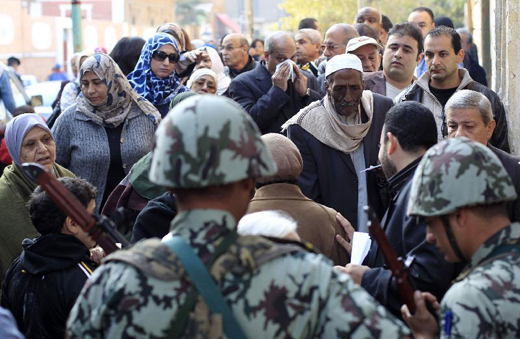- Washington “follows with interest” Morocco’s openness onto Africa (John Kerry)Posted 12 years ago
- The trial of South African Paralympic champion Oscar Pistorius opened in Pretoria on Monday.Posted 12 years ago
- USA welcomes efforts of King Mohammed VI in MaliPosted 12 years ago
- Egypt’s population reaches 94 millionPosted 12 years ago
- Mugabe celebrates his 90thPosted 12 years ago
- Moroccan Monarch to Build a Perinatal Clinic in BamakoPosted 12 years ago
- King Mohammed VI handed a donation of bovine semen for the benefit of Malian breeders.Posted 12 years ago
- Moroccan King’s strategic tour to Africa: Strengthening the will of pan African Solidarity and stimulating the south-south cooperation mechanisms over the continentPosted 13 years ago
- Senior al-Qaida leader killed in AlgeriaPosted 13 years ago
- Libya: The trial of former Prime Minister al-Baghdadi AliPosted 13 years ago
Key parliamentary vote kicks off in Egypt
 Egyptians went to the polls on Monday in the first phase of elections for the People’s Assembly, the lower house of parliament, the first since the fall of former President Hosni Mubarak in February.
Egyptians went to the polls on Monday in the first phase of elections for the People’s Assembly, the lower house of parliament, the first since the fall of former President Hosni Mubarak in February.The voting started at 8:00 a.m. (0600 GMT) in Cairo, Alexandria, Fayoum, Port Said, Damietta, Kafr El-Sheikh, Assiut, Luxor and the Red Sea, nine out of Egypt’s 27 governorates.
Several hundred voters lined up outside many polling stations in Cairo. The vote will last for two days in order to achieve a high turnout.
Three helicopters were seen hovering above Cairo to monitor the situation.
At a school near Cairo’s Tahrir Square, voters queued up from inside the building to the street outside. Police and soldiers jointly worked to ensure the order.
“I hope the election will be fair and transparent,” Shaina, a female waiting to vote, told Xinhua. She said she would cast her vote to support a political bloc.
Hussein Tantawi, head of the ruling military council, toured some polling stations in Cairo. Arab League chief Nabil Arabi also cast his vote, stat TV showed.
The People’s Assembly polls are held over three stages, each with a run-off one week after the vote. The whole vote will be finished on Jan.10 and the final results will be announced by Jan. 13.
About 17 million eligible voters are expected go to 3,809 polling stations in the nine governorates in the first stage. Around 2,357 independent candidates will contest 57 seats, while 1, 452 party candidates will compete for 112 seats.
“This is something we have never seen over the past 30 years,” said Abdoullah after casting his vote. He told Xinhua that his opinion was felt.
“We had no interest in casting votes at all, because the votes were just like invalid ones. No matter how democratic it process looked, the results were always the same,” he said, referring to the widespread rigging by the disbanded National Democratic Party in previous polls.
Fair and free elections were difficult to become true because the former ruling party allegedly rigging the process to ensure it could win the overwhelming majority of seats. In the 2010 parliamentary elections, the NDP swept the People’s Assembly but many accused the elections of being manipulated.
“I anticipated there would be many people, but really did not expect there could be so many,”said Maguidy Hassan,who queued up for about one hour before entering the election room.
This time the vote was the most transparent and significant one, because the voting rights lay really in the hands of the people, he said.
“This vote means the future of the country and our hope,” he added.
At another polling station south of Cairo, Moustafa Mohamed, 68 said he was confident about the candidates.
“They know our demands and everyone should consider selecting those who can serve the people and the country,” said the retired worker.
Egypt now has about 50 political parties, double the number before Mubarak’s fall. Some 590 party lists and 6,591 independents will contest the seats of the People’s Assembly. Some 272 party lists and 2,036 independents will contest the seats at the Shura Council, the upper house of the parliament. Each party list has four to eight candidates.
The parliamentary polls are supposed to help shape the political landscape of the country. Hussein Tantawi on Sunday called citizens to cast votes.
